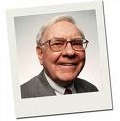 The Oracle's Annual Letter to Berkshire Shareholders is always a good read. Finally, I found some time during the weekend to go over the letter and the 2009 annual report. Owning 600 Class-B shares, I'm of course happy with the stock's performance and especially recent stock price spike. I've been owning Berkshire since 2005, and I am sure I will be happy shareholders for many more years.
The Oracle's Annual Letter to Berkshire Shareholders is always a good read. Finally, I found some time during the weekend to go over the letter and the 2009 annual report. Owning 600 Class-B shares, I'm of course happy with the stock's performance and especially recent stock price spike. I've been owning Berkshire since 2005, and I am sure I will be happy shareholders for many more years.
Predictably, the annual letter started with the Berkshire Hathaway book value change with comparison to S&P 500 index, and certainly, the Oracle is taking pride in BRK's consistently market-beating performance:
"[W]e have never had any five-year period beginning with 1965-69 and ending with 2005-09 – and there have been 41 of these – during which our gain in book value did not exceed the S&P’s gain."
This time, thanks to the recent BNSF acquisition, Buffett went to length to re-introduce each of Berkshire's business segments. If you are a new shareholder, you might want to read the Owner's Manual as well.
The annual letter has been put under microscope by all financial journalists in the last weeks or so, so more repetition won't add much value. I will just quote some interesting paragraphs:
Buffett Admitting His Mistake in the Rare Occasions of Micro-Managing at Berkshire:
---
For many years I had struggled to think of side products that we could offer our millions of loyal GEICO customers. Unfortunately, I finally succeeded, coming up with a brilliant insight that we should market our own credit card. I reasoned that GEICO policyholders were likely to be good credit risks and, assuming we offered an attractive card, would likely favor us with their business. We got business all right – but of the wrong type.
...
Our pre-tax losses from credit-card operations came to about $6.3 million before I finally woke up. We then sold our $98 million portfolio of troubled receivables for 55¢ on the dollar, losing an additional $44 million.
---
On Betting Big When Big Opportunities Show Up
---
We told you last year that very unusual conditions then existed in the corporate and municipal bond markets and that these securities were ridiculously cheap relative to U.S. Treasuries. We backed this view with some purchases, but I should have done far more. Big opportunities come infrequently. When it's raining gold, reach for a bucket, not a thimble.
---
On the Housing Bubble and Aftermath
---
People thought it was good news a few years back when housing starts – the supply side of the picture – were running about two million annually. But household formations – the demand side – only amounted to about 1.2 million. After a few years of such imbalances, the country unsurprisingly ended up with far too many houses.
There were three ways to cure this overhang: (1) blow up a lot of houses, a tactic similar to the destruction of autos that occurred with the "cash-for-clunkers" program; (2) speed up household formations by, say, encouraging teenagers to cohabitate, a program not likely to suffer from a lack of volunteers or; (3) reduce new housing starts to a number far below the rate of household formations.
Our country has wisely selected the third option, which means that within a year or so residential housing problems should largely be behind us, the exceptions being only high-value houses and those in certain localities where overbuilding was particularly egregious. Prices will remain far below "bubble" levels, of course, but for every seller (or lender) hurt by this there will be a buyer who benefits. Indeed, many families that couldn't afford to buy an appropriate home a few years ago now find it well within their means because the bubble burst.
---
On the Painful Decision to Close the BNSF Deal with Some Berkshire Stocks
---
In evaluating a stock-for-stock offer, shareholders of the target company quite understandably focus on the market price of the acquirer's shares that are to be given them. But they also expect the transaction to deliver them the intrinsic value of their own shares – the ones they are giving up. If shares of a prospective acquirer are selling below their intrinsic value, it's impossible for that buyer to make a sensible deal in an all-stock deal. You simply can't exchange an undervalued stock for a fully-valued one without hurting your shareholders.
...
In the end, Charlie and I decided that the disadvantage of paying 30% of the price through stock was offset by the opportunity the acquisition gave us to deploy $22 billion of cash in a business we understood and liked for the long term. It has the additional virtue of being run by Matt Rose, whom we trust and admire. We also like the prospect of investing additional billions over the years at reasonable rates of return. But the final decision was a close one. If we had needed to use more stock to make the acquisition, it would in fact have made no sense. We would have then been giving up more than we were getting.
...
When stock is the currency being contemplated in an acquisition and when directors are hearing from an advisor, it appears to me that there is only one way to get a rational and balanced discussion. Directors should hire a second advisor to make the case against the proposed acquisition, with its fee contingent on the deal not going through. Absent this drastic remedy, our recommendation in respect to the use of advisors remains: "Don't ask the barber whether you need a haircut."
